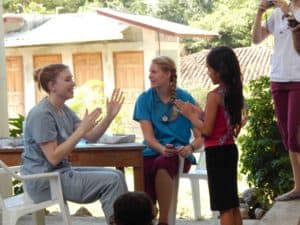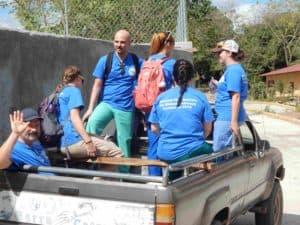
January 24, 2015
From what I heard, Buffalo, NY had about a thousand feet of snow this year. I would assume the nine graduate students and one professor from the University of Buffalo, School of Pharmacology experienced quite a shock last Monday when they arrived here in Honduras. They certainly did pick the best time of the year to come. They ended up at Shoulder to Shoulder’s clinic in Santa Lucia, one of the hottest, driest, and lowest spots in all of Honduras. The climate must have been a great shock, though perhaps a welcome one, to their bodies. The culture shock must have been pretty intense as well. They took two days to get to Santa Lucia from Tegucigalpa. They spent Monday night in a nice hotel in Siguatepeque about an hour and a half outside Tegucigalpa. The next day, however, was about five and one half hours over and down the mountains, four of which they traveled on the treacherous dirt roads, washed out and eroding. They arrived to be confronted with trickle showers, low power electricity, spotty and slow internet, the new ways of a new people, and everyone speaking Spanish.
Shoulder to Shoulder is excited to have the University of Buffalo here for the first time. The pharmacology school offers a unique brigade experience. They offered workshops with various groups like the pregnancy club in Magdalena where Laura and I met up with them. They were able to offer insight to the women relative to what medicines can and can’t be taken during pregnancy, how pharmacology works in health in general, preventative care strategies, etc. The doctors and nurses at the various clinics and health centers were impressed and pleased with the brigade work. The doctors and nurses, and even the health promoters, are so often overwhelmed dealing with large volumes of patients and emergencies that they don’t find the time for teaching prevention and home health care. The work Buffalo did was tremendously valuable and greatly appreciated.
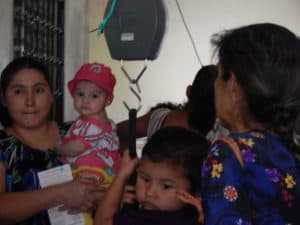
The students were thoroughly enjoying their cross-cultural, service experience. None of them spoke Spanish, though the interpreters were excellent. Many had been to foreign or developing countries in the past. Their leader student, Ciera, had been twice to the Dominican Republic on service trips. She hopes that this early commitment from Buffalo will be a long and meaningful one for the school. We hope so too. Speaking with one of the participants about how he was experiencing the culture and the people, he paused and thoughtfully reflected. He shared that so much of person’s lives in the US are consumed with the acquiring of things. Here people are much more present to other people. People really take sincere interest in one another, and things are just not so important.
We are certainly taking interest in you, Buffalo. You have so much to offer. We thank you for your generous, unselfish response. We will be looking forward to your return. Hopefully it will again be in January so you can all get away from the snow, ice, and cold.
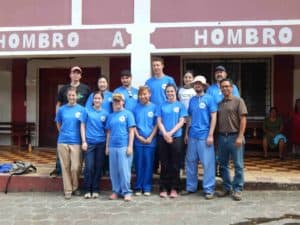
Educate a Child and Change the World
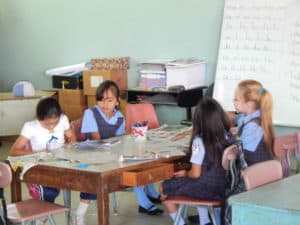
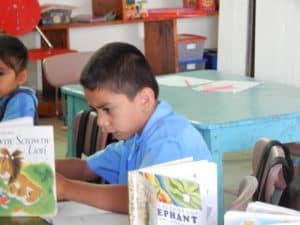
November 24, 2014
Shoulder to Shoulder is pleased and proud to introduce the Good Shepherd Bilingual School Sponsorship Program to advance our mission in the frontier region of Intibucá, Honduras.
Why Education?
The river story, often attributed to the social reformer Saul Alinsky, recounts a scene along the banks of a fast moving river. People are drowning and others are jumping into the river to save them. One individual leaves the scene to move upstream. He is initially scolded for abandoning the vital task of saving lives. But, he is actually searching out the source of the problem to learn why and how people are falling into the river in the first place, in order to resolve the issue.
Education in Honduras is certainly an upriver issue. Children are only legally required to go to school through the sixth grade. Public education is free in Honduras. But when you factor in costs of transportation, books and materials, uniforms, and so on, families that can barely feed themselves are greatly burdened by this “free” education. Public education is poorly supported by the Honduran government. Buildings are inadequate and not maintained. Materials are unavailable or offered at a price that students can’t afford. Teachers are ill-prepared. These chronic problems affect all of Honduras, but in the neglected area of the frontier region of Intibucá, they are exacerbated. Children mostly do not continue their education beyond the sixth grade. The economic reality of most families demands that they assist with farm labor or find other low paying employment. Whereas Hondurans with some financial means send their children to quality, private schools, poorer families simply do not have the opportunity.
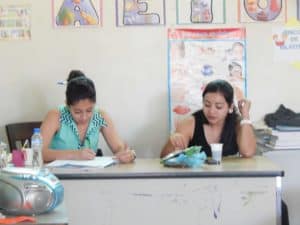
It is true enough that children are drowning. It is a faulted education system that has tossed them into the river. How many scholars, civil engineers, doctors, physicists, lawyers, artists, musicians, leaders, and visionaries are unknown to Honduras because learning was unavailable to them? It is a sobering thought.
Shoulder to Shoulder is moving upriver. Since its inception, Shoulder to Shoulder has invested in quality education for young people. Our scholarship program enables over one-hundred young people to continue their education beyond the sixth grade, even unto college. The generosity of donors is matched to young people according to merit and need. This is making a substantial difference in their lives individually as well as within the communities they come from and will go to as professionals. In 2012, Shoulder to Shoulder partnered with the Good Shepherd Community of Cincinnati and founded Good Shepherd Bilingual School in Camasca, Intibucá. The building has been erected and three grades (kindergarten, first, and second) are presently enrolled.
The school is public, accessible to everyone, and offers a quality, bilingual education. It is the only one of its kind in all of Honduras. It exists as a collaborative effort among the Honduran Government, the Municipalities of the frontier region of Intibucá, Shoulder to Shoulder, and the students’ parents. Honduras considers it a model for public education. It offers unimagined opportunities for its alumni as well as substantive change for Honduras.
Shoulder to Shoulder believes that you, our donors and benefactors, would like to be part of this historic undertaking. We humbly invite you to seriously consider sponsoring one of the Good Shepherd Bilingual School children. We are certain that this synergetic relationship of generosity and gratitude will be transformative for both you and your sponsored child. Your commitment today will illuminate the path from poverty to progress.
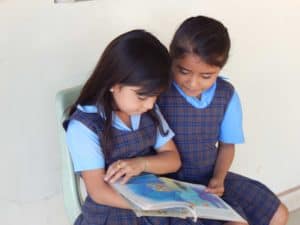
Help us to move up river! www.shouldertoshoulder.org/sponsorshipprogram
Rude Roosters and Patty Cake
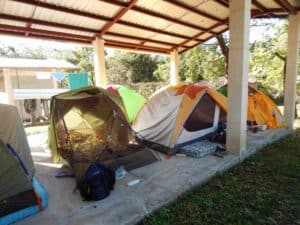
November 22, 2014
She hasn’t had a good night sleep since coming to Honduras. It isn’t sleeping in a tent on a concrete floor under the stars. The tent, after all, is placed over a semi soft mattress. It’s not the time change, only an hour’s difference. The tropical warmth doesn’t seem to bother her, even though she does live in Wyoming and it is mid-November. Those squirmy and crawly things are close by, but she’s not the type to jump up on a chair at the threat of a mouse. What is it then that keeps her awake half the night? She had once been told, and always believed it to be true, that roosters only crow to greet the sunrise. Actually, and this is not scientifically proven, roosters crow because they abhor silence, beginning their wrenching screams sometime around midnight and only slowing down sometime after dawn. Unfortunately, here in the frontier region of Intibucá, in the small village of Agua Salada, this tone-deaf choir outnumbers the human population by at least three to one.
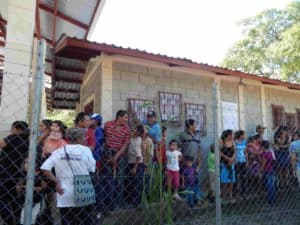
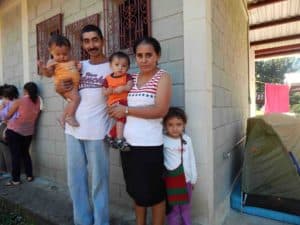
On Tuesday she is dragging a little bit. Perhaps that’s why the brigade leaders have given her light duty, fitting and distributing reading glasses. Still, when it’s real slow, she might be asked to assist with an injection or minor surgery. On occasion the pharmacy gets busy and she’s called over to fill prescriptions. On Monday, one of the leaders guessed that they saw about 120 patients. Perhaps everyone had shown up on the first day, but on Tuesday there are actually more. The word must be traveling to the more outlying districts. Whether tomorrow will bring more, or whether it might start to wane, no one is sure. But hundreds come, lined up for hours, to see one of the four doctors available; to get a diagnosis, a prognosis, a word of assurance and comfort sometimes in broken Spanish and sometimes via translators, a medication, a treatment, and some relief.
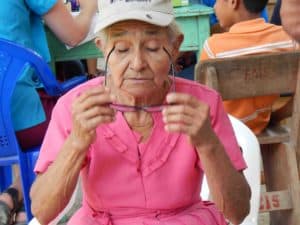
If that is all the Wyoming Brigade does, it’s certainly a great deal. But the generosity extends beyond the clinic and into the homes and lives of the residents of Agua Salada. They came with hygiene supplies. They came with school supplies. They now provide school scholarships for five local children and look to provide more. This is not simply about a generous gift, but rather it is about the commitment of relationship. The University of Wyoming partners with the community of Agua Salada and Shoulder to Shoulder such that enrichment, development, transformation, and meaningful growth are deeply rooted into the hearts of all involved: brigade members, beneficiaries, community leaders, and all who are committed to the relationship.
Later in the day when the lines are receding, the young nursing student who hasn’t gotten much sleep due to the rude roosters, might have slipped away to grab an hour or two siesta. She doesn’t speak Spanish, but all day long she’s been using the international language of play with children. I spy her now with two girls, maybe seven and eight years old. They are fully engrossed in a game of “patty cake” — mimicking, mirroring, and hand slapping. The smiles on their three faces, the sign of commitment and love, are the most powerful medicine that the University of Wyoming has distributed all day.
